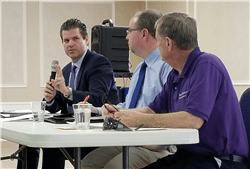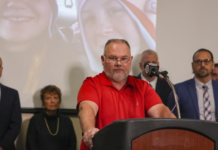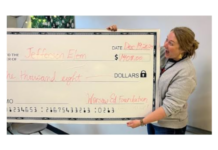What was intended as an opportunity to recap Indiana’s legislative session on Friday in Warsaw turned into more of an update.
That’s because Gov. Eric Holcomb called for a special session earlier this week after the General Assembly ended its regular session a week ago in a chaotic fashion, leaving several bills without final votes.
The frantic conclusion of the regular session came despite Republicans having supermajorities in both chambers.
“This was an unusual session,” said State Rep. Dave Wolkins, who represents District 18.
“Probably one of the most frustrating sessions we’ve had,” Wolkins said. “We did run out of time and we’re getting a lot of criticism for it.”
Wolkins was joined by State Rep. Curt Nisly (District 22) and State Sen. Ryan Mishler (District 9) at Friday’s legislative update at the Shrine Building in Warsaw. The event was hosted by the Rotary Club and Kosciusko Chamber of Commerce.
Mishler said he thinks the special session is needed because several millions of dollars hang in the balance. He said he hopes the focus remains on just a handful of unfinished bills and that lawmakers finish work in one day.
Wolkins warned that it could end up taking two or three days, and that suspending procedural rules could open the door for consideration of other bills.
One bill that will likely be addressed in the special session is the governor’s request for $5 million in grants to improve school security. The proposal also calls for another $1 million to audit schools to assess safety needs.
Wolkins tipped his hat to Mishler, who is chairman of the Senate Appropriations committee, for taking a stand on legislation that would create a fourth Superior Court in Kosciusko County.
While the bill sailed through all of its votes, the legislation fell into doubt late in the session over funding. Mishler helped reach a compromise that ensured it will be funded in 2019.
Instead of funding from the state being available this year, lawmakers approved the plan, but delayed funding for a year.
“This isn’t a major endorsement for Sen. Mishler, but it’s awful good having him in the position he’s in,” Wolkins said. “He gets to decide how $30 million is spent every few years.”
Kosciusko County Council President Sue Ann Mitchell attended the meeting and thanked lawmakers for passing the bill, saying the move will ease overcrowding in the courts and the jail.
Wolkins and Nisly also brought up two marijuana-related issues, including the passage of a bill that will allow the legal purchase and use of CBD oil, a product derived from hemp that is designed to provided medical relief for certain maladies.
The bill clears up confusion about the legality of CBD products in the state.
“The public’s view is changing,” Wolkins said.
A woman asked for a clarification on what the CBD acronym stood for and what it achieves. Technically, it’s short for cannabidiol.
Nisly couldn’t identify what the acronym stood for, but said he’s under the impression that it provides pain relief, including possibly migraines.
“There are a lot of different things that people say it can be used for,” Nisly said.
“I suggest you go find some and see what it does for you,” he said, drawing some laughs.
Wolkins added that it appears medical marijuana, which is legal in 29 states, including Michigan, will be studied in a summer session and that some form of legislation could be considered next year.
He said the problem cited in states where it is legal is that it is being used for recreational use.
Nisly said he believes part of the focus this summer will include a look at the social impact of medical marijuana legalization.
“I’m glad we’re having a conversation on it,” Nisly said.
One bill that Nisly touted was a change in child labor laws that will now allow for teens to work as late as 10 p.m. if there is no school scheduled for the next day.
“This lets the younger kids get some good job experience,” Nisly said.





